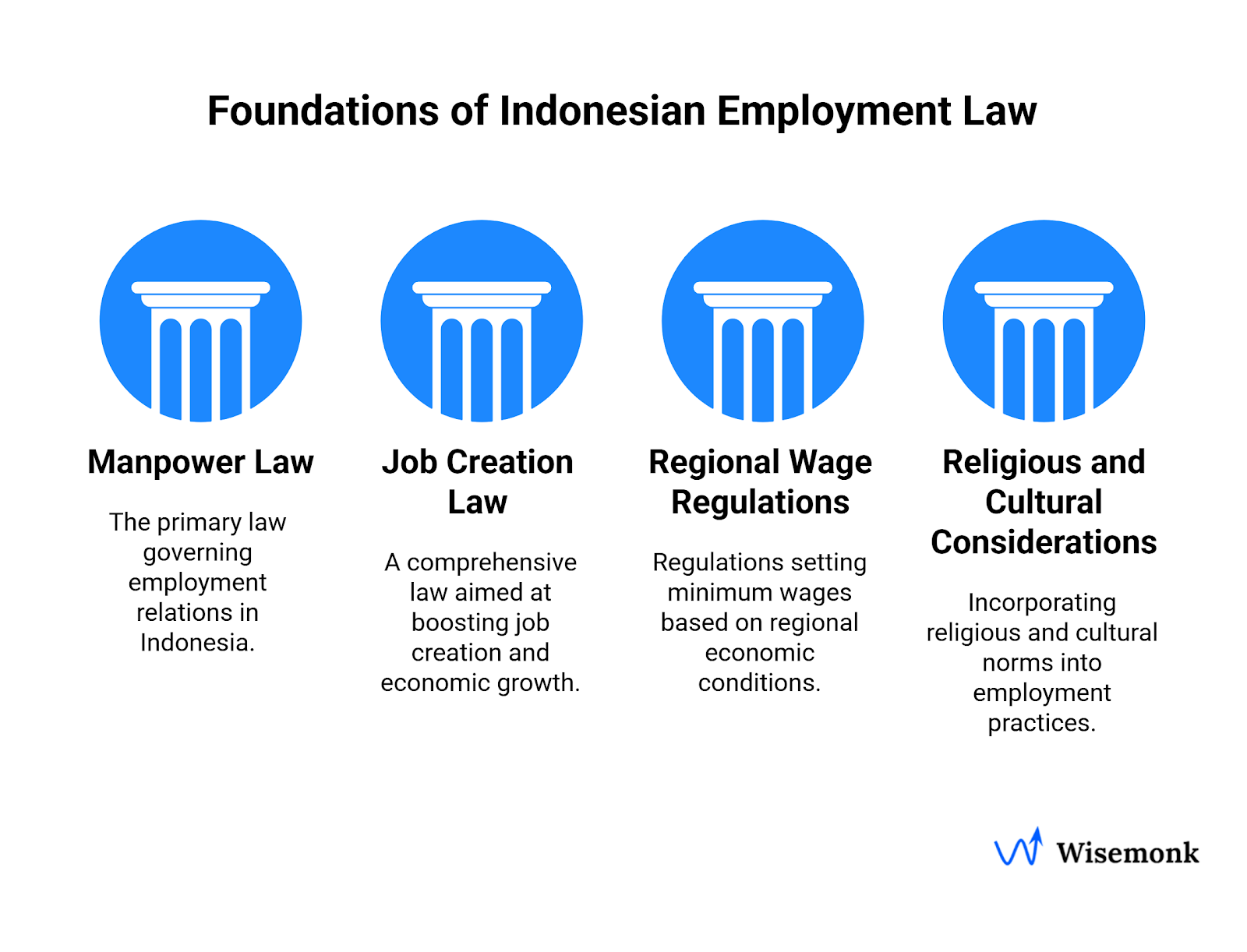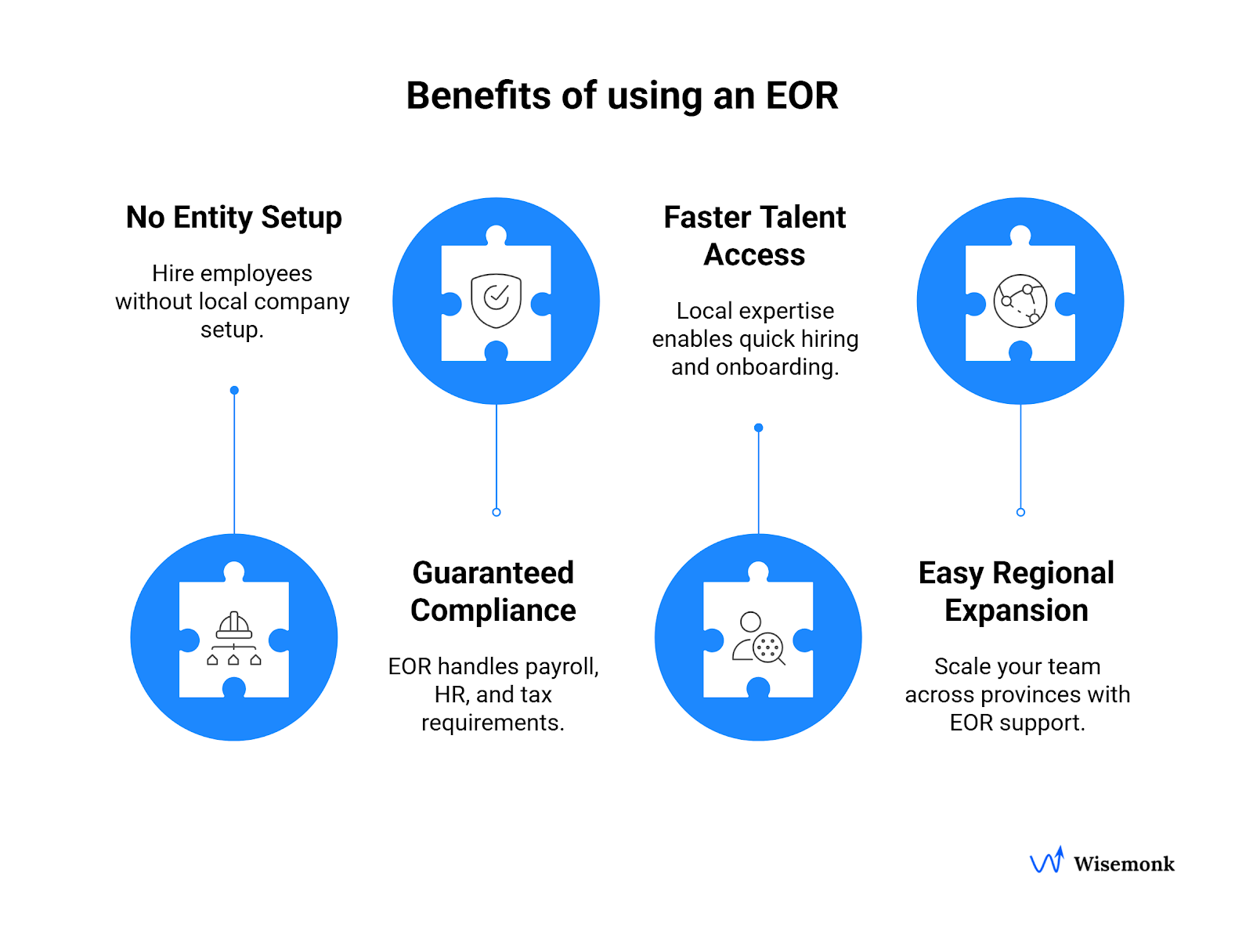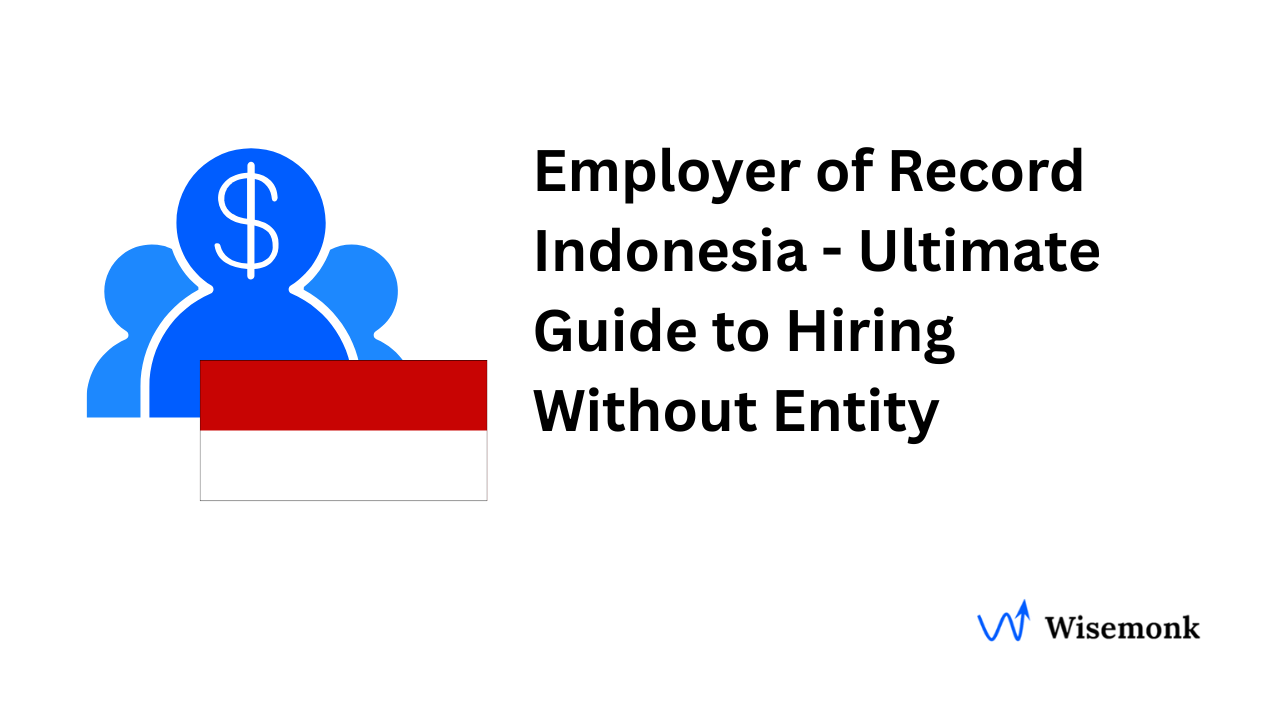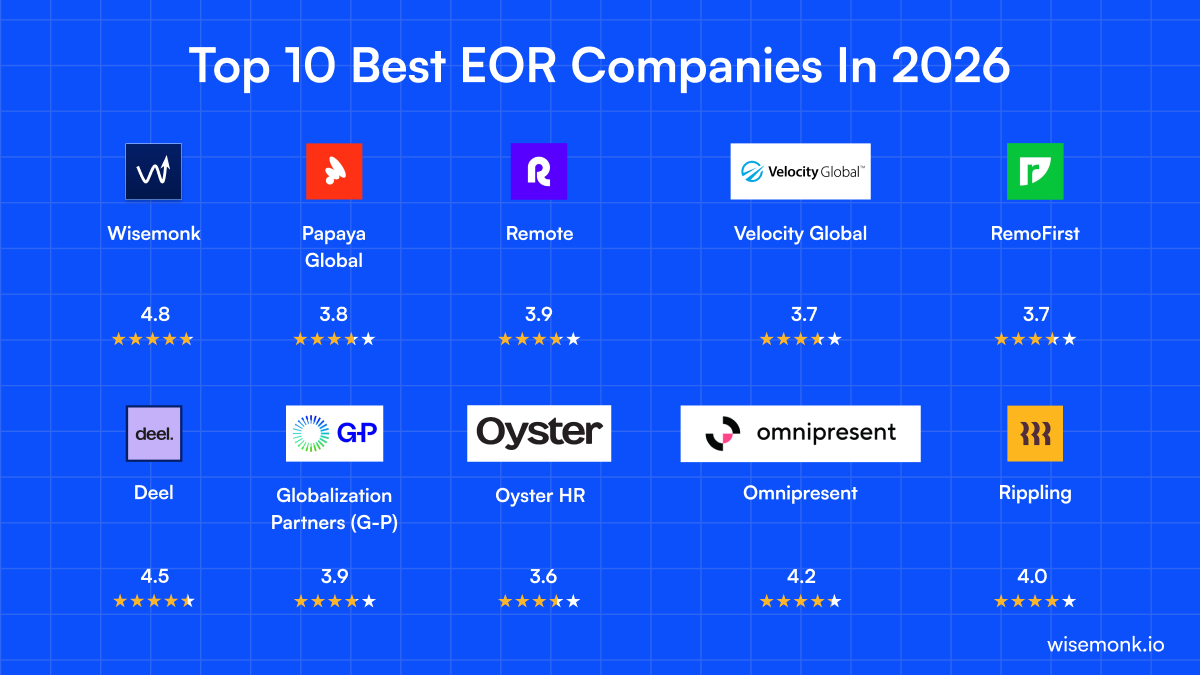Looking to hire in Indonesia? The country’s evolving Manpower Laws, complex local labor regulations, region-based minimum wage rules, and religious or cultural holiday entitlements make compliance a serious challenge for foreign businesses.
An Employer of record Indonesia simplifies everything, handling payroll management, social security contributions, tax compliance, and compliant employment contracts, so you can hire employees efficiently, manage legal risks, and focus on growth instead of paperwork.
What are the Indonesian Employment Law Frameworks Businesses need to know?[toc=Employment Law Framework]
Expanding to Indonesia means navigating a distinct regulatory environment. In our experience guiding international employers, understanding the local law landscape is non-negotiable for full compliance. Here’s a practical breakdown of Indonesia’s main employment law pillars and what they mean when partnering with an employer of record in Indonesia.

Key Indonesian Labor Laws include:
- Manpower Law (Law No. 13 of 2003): The foundational regulation for employment relationships, covering permanent and fixed term contracts, compensation pay, minimum wage, working hours, paid annual leave, severance pay, and collective agreements. (Indonesia - Law No. 13/2003 concerning Manpower. )
- Job Creation Law (Omnibus Law, Law No. 11 of 2020): Introduced major reforms, including flexibility in fixed term contracts and simplifying the hiring process for both local and foreign workers (The Bill on the Determination of the Job Creation).
- Regional Minimum Wage Regulations: Minimum wage differs across provinces and cities. For 2025, Jakarta sets one of the highest at IDR 5,067,381 per month. In our research, EOR clients often seek guidance for compliance in multiple regions with different standards (Minimum Wage in Indonesia - Indonesia Guide).
- Religious and Cultural Considerations: Indonesian law requires payment of a religious holiday allowance (THR) before major religious holidays and respects various local traditions within employment agreements and benefits administration.
What Are the Key Benefits of Using an Employer of Record Indonesia?[toc=Key Benefits of EOR]

- No Entity Setup Needed: Hire employees without creating a local company or facing Indonesia’s complex bureaucracy.
- Guaranteed Compliance: EOR handles all payroll, HR, and tax requirements under Indonesian labor regulations, minimizing legal risks.
- Faster Access to Local Talent: Local expertise enables quick hiring and smooth onboarding for skilled full time employees or contractors.
- Easy Regional Expansion: Scale your team across provinces or Southeast Asia while the EOR manages payroll and benefits administration.
In our experience, companies choosing EOR services Indonesia benefit most from speed, compliance, and the flexibility to grow without heavy administrative tasks.
How Does Employer of Record Indonesia Ensure Payroll and Tax Compliance?[toc=Payroll &Tax Compliance]
Employer of record Indonesia handles all payroll management and tax compliance requirements for you, minimizing legal risks and administrative workload.
- Payroll Management: EOR services Indonesia process monthly payroll in local currency, managing gross salary, tax deductions, social security (BPJS) contributions, and overtime pay.
- Tax Compliance: The EOR manages all monthly and annual filings with the tax authorities, ensuring payroll taxes, including income tax (PPh 21) and BPJS Kesehatan, for every employee are calculated, withheld, and submitted on time.
- Social Security Contributions: Every employee is registered for BPJS Kesehatan (national health insurance) and BPJS Ketenagakerjaan (employment social security). EORs handle ongoing payments and records for both local and foreign workers.
- Tax Treaty Support: EORs help foreign employees and global businesses access Indonesia’s tax treaty benefits, reducing risks of double taxation.
Based on our experience with clients, this approach helps companies avoid payroll mistakes, stay updated on regulation changes, and confidently meet all Indonesian labor compliance obligations.
What Employee Benefits and Entitlements Does Employer of Record Indonesia Manage?[toc=Employee Benefits & Entitlements]
An employer of record Indonesia ensures your business meets all requirements under Indonesian labor laws by managing these key employee benefits:
- Religious Holiday Allowance (THR): Employees receive a Tunjangan Hari Raya, one month’s salary paid before a major religious holiday, as mandated for full compliance (Religious Holiday Allowances in Indonesia).
- Annual Leave Entitlements: At least 12 days of paid annual leave are granted after a year of service, following Manpower Law No. 13/2003. EOR services Indonesia make it simple to manage these entitlements in line with local regulations.
- Overtime Regulations: Work beyond 40 hours per week or outside standard hours triggers overtime, which must be paid at government-set rates. The employer of record ensures all compensation pay and payroll management meets legal standards.
- Severance Payment Requirements: Employment contracts must clearly state severance pay and long service pay terms. The EOR handles calculations and payouts according to the law, reducing disputes and legal risks.
By outsourcing these legal and administrative responsibilities to an EOR, companies remain fully compliant, avoiding penalties and guaranteeing employees receive every statutory benefit.
What Does the Hiring and Onboarding Process Look Like with an Employer of Record?[toc=Hiring & Onboarding Process]
When working with an employer of record, the hiring and onboarding process is clear, compliant, and efficient. Here’s a step-by-step overview:
- Required Documentation: You’ll need to collect valid identification (KTP for locals or passports for foreign employees), tax identification numbers (NPWP), and work permits such as KITAS or KITAP for foreign workers.
- Background Verification: This includes checking employment history, references, and occasionally criminal records or educational certificates to ensure candidate suitability.
- Employment Contract: The employer of record prepares compliant employment contracts in Bahasa Indonesia that clearly state job responsibilities, salary, benefits, working hours, and termination terms, all adhering to Indonesian labor laws.
- Onboarding Timeline: From offer acceptance to full employee registration, the process usually takes one to three weeks, depending on document completion and background checks. The EOR registers the employee with government bodies like BPJS and the tax office.
- Integration: The EOR facilitates smooth communication between the client company and new employees, ensuring seamless onboarding and employee record management.
In our experience, having an employer of record manage the hiring and onboarding means you can focus on growing your business, while leaving legal and administrative responsibilities in trusted hands.
How Do You Manage an Indonesian Workforce?[toc=Workforce Management]
Managing an Indonesian workforce requires understanding both legal requirements and local culture. Based on our experience working with international businesses, here’s what matters most:
- Respect for Hierarchy and Traditions: Indonesian workplaces value respect and harmony. Leaders should promote teamwork while honoring cultural and religious practices.
- Clear, Polite Communication: Feedback is best given diplomatically, avoiding direct confrontation. Encouraging open dialogue helps but must respect local norms.
- Performance Management: Regular check-ins and recognition motivate employees. EOR services ensure that performance reviews and probation periods comply with Indonesian labor laws.
- Religious Accommodation: Employees observe diverse religious holidays and fasting periods. The employer of record manages schedules and paid leave to respect these observances.
In summary, combining local expertise with cultural sensitivity allows employers to build a compliant, motivated, and loyal workforce in Indonesia.
What Are the Termination Procedures in Indonesia?[toc=Termination & Dismissal Procedures]
Terminating employment in Indonesia involves specific legal steps to protect both employers and employees. Based on our experience, here’s a clear overview of what employers need to know when managing terminations through an Employer of Record in Indonesia:
- Dismissal Categories: Employment can be ended through resignation, mutual agreement, or termination for cause (e.g., misconduct, redundancy).
- Notice Requirements: Indonesian labor law requires employers to provide written notice to employees, typically 30 days in advance or pay in lieu of notice.
- Severance Pay: Severance and long service pay depend on the employee’s length of service and reason for termination. The employer of record calculates and manages these payments accurately to comply with local laws.
- Dispute Resolution: If disputes arise, they are usually resolved through the Industrial Relations Court. An experienced EOR helps handle legal matters and documentation to minimize risks.
Using an employer of record ensures all termination procedures follow local employment laws, reducing legal exposure and protecting your business reputation.
How Does Cost Analysis and ROI Work for Employer of Record Indonesia?[toc=Cost Analysis & ROI]
When comparing costs, using an employer of record Indonesia is typically much simpler and more predictable than setting up your own legal entity.
- EOR Service Fees: You pay a straightforward monthly fee per employee that covers payroll management, legal compliance, employment contracts, and benefits administration. This makes budgeting easier versus the complex expenses of an in-house setup.
- Hidden Costs Avoided: Starting your own entity involves large upfront legal and administrative costs, ongoing payroll taxes, social security contributions, and risks of fines for compliance errors. EOR services let you avoid these surprise expenses.
- Benefit Planning: EOR manages all statutory benefits, such as religious holiday allowances (THR), paid annual leave, health insurance, and severance pay, so you can plan your budget with confidence.
- ROI in Practice: Key benefits include faster hiring, lower compliance risk, and reduced admin costs. Many companies see quicker market entry and direct savings versus building their own local teams.
An employer of record Indonesia streamlines hiring costs and maximizes your return on investment by handling all legal and administrative responsibilities, so you can focus on your core business.
What Are the Common Challenges and Solutions with Employer of Record?[toc=Challenges]
Managing employees in Indonesia isn’t without its challenges, especially for foreign companies. From our experience as a leading EOR service provider, here are the main hurdles and how an employer of record can help:
- Complex Bureaucracy: Indonesia’s regulations and permits can be confusing and time-consuming. An EOR handles all legal and administrative tasks, speeding up your hiring process.
- Cultural Differences: Understanding local communication styles and workplace culture is vital. EOR providers offer local expertise to help you manage and integrate your Indonesian team smoothly.
- Changing Regulations: Employment laws in Indonesia evolve regularly. EORs stay updated and ensure your business remains fully compliant.
- Scaling Operations: Different regions have varying requirements like minimum wage and benefits. An EOR adapts to these regional differences, making expansion easier.
By partnering with an employer of record in Indonesia, you can overcome these challenges confidently and focus on growing your business.
Conclusion[toc=Conclusion]
Using an employer of record Indonesia simplifies hiring by managing compliance, payroll, work permits, and employee benefits without requiring a local entity setup, cutting down setup time, costs, and legal risks for fast, flexible expansion. Businesses planning to expand should clearly define their Indonesian workforce needs and timelines, evaluate reputable EOR providers with strong local expertise, and assess their service offerings and pricing.
Here are a few action items for implementation:
- Determine the size and key roles for your Indonesia team.
- Request and compare proposals from multiple EOR providers focusing on compliance and local knowledge.
- Plan employee onboarding and systems integration with your chosen EOR platform.
- Monitor updates to Indonesian employment laws for ongoing compliance.
Following these steps helps companies enter the Indonesian market quickly, efficiently, and with confidence.
Ready to expand your workforce quickly and compliantly? Partner with Wisemonk’s Employer of Record services to effortlessly manage hiring, payroll, and compliance, so you can focus on growing your business with confidence.
Frequently asked questions
What is the THR (religious holiday allowance)?
THR is a mandatory annual bonus equivalent to one month’s salary paid before major religious holidays to all employees.
How does the Indonesian social security system work?
Employees and employers contribute to BPJS Kesehatan (health insurance) and BPJS Ketenagakerjaan (employment security) monthly as required by law.
What are the work permit requirements for expatriates?
Foreign workers need a valid work permit (KITAS/KITAP) and must be registered with Indonesian immigration and labor authorities through the EOR.
How are severance payments calculated?
Severance is based on service length and termination reason, following formulas set in Manpower Law and Job Creation Law.
What are the cultural considerations for managing Indonesian employees?
Respect hierarchical communication, accommodate religious observances, and provide feedback diplomatically to foster a positive work environment.
What is the best Employer of Record (EOR)?
Top EOR providers include Deel (global hiring and compliance), Papaya Global (international payroll), Velocity Global (global expansion support), Remote (fast and compliant hires), and Wisemonk (India-focused EOR).
What is a record of employment?
A record of employment (ROE) is an official document that details an employee’s work history, earnings, and reason for leaving, often used to apply for unemployment benefits.

.png)
%20(1).webp)
